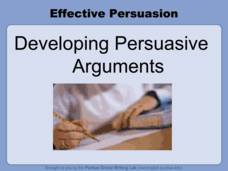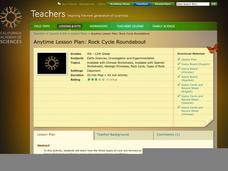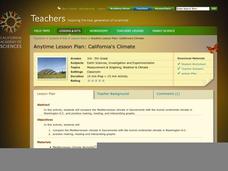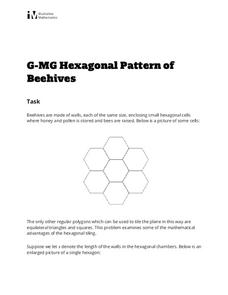Curated OER
Symbolism: Meaning beyond the obvious
Before exploring symbols in literature, show your class this PowerPoint to discuss symbolism and different, well-known symbols. Then, the viewers note what a variety of colors might symbolize before looking at different cartoons and...
Curated OER
Effective Persuasion: Developing Persuasive Arguments
Use research to strengthen a persuasive argument. Examples of ethos, logs, and pathos are presented, and learners discuss how using research can improve one's argument. Pair this presentation with an example persuasive piece to point out...
California Academy of Science
Rock Cycle Roundabout
After a basic introduction to the rock cycle and the three main types of rocks, young geologists can deepen their understanding of how rocks change through a fun learning game. Based on the characteristics and events shared by a reader,...
Curated OER
Bering Sea Buffet - A Foodweb Activity
Life in the Bering Sea, food webs, and the ocean ecosystem are introduced with a map activity. The lesson starts as kids explore maps and images of the Bering Sea, then it kicks into high gear as they start to discuss the types of...
Scholastic
Study Jams! The Kingdoms of Life
Zoe and RJ discuss the way scientists classify organisms into five kingdoms. Characteristics of each group are highlighted within their conversation and with text. First-time taxonomists can view the animation at home, take the...
California Academy of Science
California's Climate
The United States is a large country with many different climates. Graph and analyze temperature and rainfall data for Sacramento and Washington DC as you teach your class about the characteristics of Mediterranean climates. Discuss the...
Penn State
The 4 A’S of Dealing with Stress
Stress is rampant in today's society, and it is important that we equip young learners with the tools to cope with stress in a way that promotes lifelong health, wellness, and productivity. Discover the four A's of dealing with stress —...
Illustrative Mathematics
Alike or Different Game
How are a circle and triangle alike? How are they different? These are the types of questions children will answer while playing this fun geometry game. Including a variety of conventional and unconventional shapes, this activity allows...
PBS
Dear Pen Pal
Explore cultures from around the world with an engaging pen pal resource. Through a series of classroom activities and written correspondence, children learn about the favoritec pastimes, schooling, geography, and weather that is...
CPM
How to Recognize the Type of Graph from a Table
Linear, quadratic, and exponential functions are represented only by their table of values in this simple, well-written worksheet. Learners decide the type of graph represented based on the differences in the function values. Included is...
Curated OER
Comparing Exponentials
Growing money exponentially is the context of this scenario that asks learners to compare investments in two certificate of deposit accounts. Your young investment analysts will learn about the exponential characteristics of money...
Curated OER
Your Father
Your learners will explore the idea that not all functions have real numbers as domain and range values as seen in this real-life context. Secondly, the characteristics required for a function to have an inverse are explored including...
Curated OER
Parallel, Perpendicular, or Neither
Study the difference between parallel and perpendicular lines with a set of study cards. After filling in notes (found on the second page), kids can quiz each other on the characteristics of each line, including a section that represents...
Curated OER
Why Does SAS Work?
Your geometry learners are guided by questions that help them use the language of reflections to explain the Side-Angle-Side congruence between two triangles in this collaborative task. Given a sample solution, declaring the triangles...
Macmillan Education
Sine and Cosine Graphs
Learners compare and contrast sine and cosine graphs in order to describe their characteristics in a collaborative activity. As they explain their reasoning, learners strengthen their writing and vocabulary skills associated with sine...
Sea World
Seals, Sea Lions, and Walruses
Learn about the mammals of the sea with a lesson about seals, sea lions, and walruses. Kids study the characteristics of each pinniped with flash cards and information, and then analyze data about elephant seals, measure heat loss in...
Nicole Wachell
Symbolism in Lord of the Flies
Symbols play an important role in William Golding's Lord of the Flies. Examine these symbols with a straightforward worksheet. Given the symbols, pupils fill out a chart by noting down characteristics of the symbols, details about each...
Ed Migliore
Linear Equations in Two Variables
This traditional textbook style unit includes vocabulary, a direct explanation section, examples, practice problems that directly line up with the explanations and examples, and a unit summary review and practice problems. Learners get...
PBS
Adding Integers
Your sixth and seventh graders deepen their understanding of a number line and adding integers in this concrete, hands-on activity. Learners play "Warehouse Puzzle" and then discuss their game strategies and the characteristics...
Education Outside
Leaf Adaptations
Long life or a fast life cycle? Class members each gather a leaf, observe its characteristics such as texture, surface, scent, design, shading, and size and then discuss the adaptations made for survival as well as what the leaf reveals...
ARKive
Adaptations for Movement
What animals are best suited for moving around a rainforest, or a desert? Design your own animal species based on a particular habitat, focusing on the characteristics it will need for optimal movement. Great as a group lesson or...
K12 Reader
Taiga Ecosystems
After reading a short article about taiga ecosystems, middle schoolers are asked to identify the characteristics of this chilly environment.
Illustrative Mathematics
Hexagonal Pattern of Beehives
Young geometers and biologists investigate the math of nature in an activity that is just the bee's knees. Participants will study the tessellations of hexagons in a beehive, along with the natural rationale behind the specific shape....
National Science Teachers Association
Hop into Action
Young scientists find out what makes amphibians such unique and interesting animals in this simple life science lesson. After looking at pictures and discussing the characteristics of amphibians, learners complete a series of three Venn...
Other popular searches
- Characteristics of Fables
- Characteristics of Life
- Fairy Tale Characteristics
- Characteristics of Mammals
- Genre Characteristics
- Characteristics of Folktales
- Characteristics of Animals
- Folktale Characteristics
- Characteristics of Poetry
- Characteristics of Leaves
- Insect Characteristics
- Plant Characteristics

























